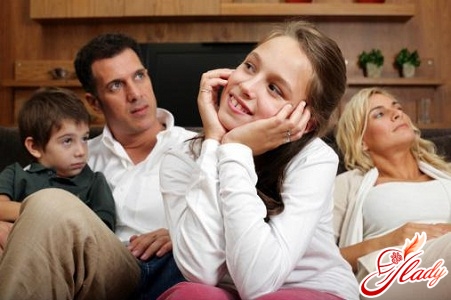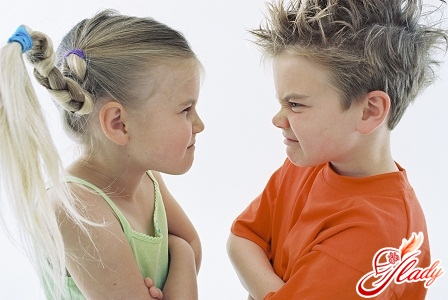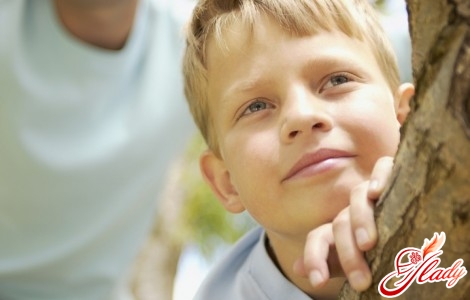 Rights of parents, children's rights. These words sound so often, then most people just do not pay any attention to them. And only a few people know what these enigmatic rights and duties of children and parents are. However, very often this knowledge is lacking just when they are very necessary. All the rights and duties of parents and children are divided into two main groups: property and personal. Property rights, in turn, are subdivided into alimony rights and obligations and property rights. At first glance, such a construction may seem complicated, but in reality it is not so. By the time you finish reading this article, you will be practically an expert in this field. Not so long ago, the light saw the new Family Code of the Russian Federation. There was a significant number of amendments and changes, which greatly facilitate the regulation of personal relationships between children and parents. In addition, the rights of the child are ensured by the conditions of the child's humane and correct educational process. If, of course, you will comply with these rules.
Rights of parents, children's rights. These words sound so often, then most people just do not pay any attention to them. And only a few people know what these enigmatic rights and duties of children and parents are. However, very often this knowledge is lacking just when they are very necessary. All the rights and duties of parents and children are divided into two main groups: property and personal. Property rights, in turn, are subdivided into alimony rights and obligations and property rights. At first glance, such a construction may seem complicated, but in reality it is not so. By the time you finish reading this article, you will be practically an expert in this field. Not so long ago, the light saw the new Family Code of the Russian Federation. There was a significant number of amendments and changes, which greatly facilitate the regulation of personal relationships between children and parents. In addition, the rights of the child are ensured by the conditions of the child's humane and correct educational process. If, of course, you will comply with these rules.
Parental rights in relation to the child
Parental rights have a number of characteristics. And the most important of them is urgency. Parents' rights have a strictly defined term, which in our country is equal to eighteen years. That is, the rights of parents have their validity only until the child has reached the age of majority. In addition, parental rights can also be terminated prematurely also if the minor child marries or acquires full legal capacity before reaching the age of majority. All such cases are strictly stipulated in the legislation. The rights of parents harmoniously combine the conformity of both the interests of parents and the interests of children. After all, as you understand, parental rights simply can not contradict the interests and well-being of children. After all, the most important task of any mom and dad is first of all their well-being, and caring for them is always paramount. Non-equal parents are severely punished, since cruel neglect and negligent attitude, degrading attitude and exploitation of children are strictly prohibited by the current legislation of the Russian Federation, and the punishment is not only deprivation of parental rights, but also in criminal liability. All parental rights are granted to both parents equally to both the mother and the father. And it does not matter at all whether the parents live together, or separately. Until one of the parents is legally deprived of parental rights, he has the full right to participate in the child's upbringing process. And all questions that concern the education, treatment and upbringing of the child must be previously agreed upon by both parents. In the same case, if there are any disagreements on this score that can not be resolved by negotiations, one of the parents or both has the full right to seek assistance in making a decision in the local guardianship and trusteeship agencies or to the court.
- Parents have the right to establish paternity
In the event that the child was born atparents who are not in an official marriage, it is possible to establish paternity. Legislation of the Russian Federation provides for two ways of establishing paternity: voluntary and with judicial procedure. If the father and mother agree to recognize the fact of paternity, they must apply to the local bodies of the REGISTRY OFFICE with a joint statement. Based on this statement in the child's birth certificate, the father's passport will contain the passport data of the father. And together with the certificate of the birth of a child you will be given a certificate on the establishment of paternity. If one of the parents does not want to establish paternity by way of a voluntary agreement, the second parent can file a claim on the origin of the child from the individual to the court. Contact the guardianship and trusteeship agencies - they will certainly help you write the application correctly, and it may well be that they will act as your legal representative in court. There is an opinion that for the establishment of paternity, a genetic examination is mandatory, the consent of which the second side does not always give. However, in fact, the court takes into account any strong evidence that can confirm the origin of the child from a particular person.
- The right to give the child a name, surnames and patronymic
All parents have the right to choosefor his child the name, surname and patronymic of the child, in accordance with the norms of the Family Code of the Russian Federation. The parents have the right to give the child a name absolutely any, and the registry offices will be obliged to register him, the surname is given to the child either the mother's or the father's, if they are different. In the same case, if parents can not achieve unanimity on this issue, the bodies of guardianship and trusteeship can help in resolving the conflict situation. They will try to find a compromise option, which will suit both sides. And, finally, the patronymic in the case of established paternity is given on the basis of the father's name, and in the event that the mother is lonely - the patronymic is written down with the words of the mother.
- The right to change the child's name and surname
In the event that for some reasonparents decide to change their name to their child under the age of sixteen, they must file a joint application with the registry office, as well as guardianship and guardianship, asking for permission to change their name. The same applies to situations in which parents who bear different surnames want to change the existing child's name to the surname of the other parent. By the way, if the child is already ten years old, then in addition to the permission of the guardianship and trusteeship agencies, they will need the consent of the child himself. Most often, the guardianship and trusteeship agencies decide to permit the change of name and surname to the child:
However, remember that a single algorithmsimply does not exist. And the decision on the satisfaction or refusal of the claim for changing the child's name or surname, the guardianship authorities and the court accept strictly individual procedures, taking into account the interests of the child first, and only then of the parents. Therefore, in the event that you decide to change the child's name or surname, think carefully about your decision. First of all, think about the child - whether he wants it. And when you change your last name, you should not hurry too much - what if you reconcile with an ex-spouse? Or again get married? Will you change your surname again? And if you again divorce? Do not treat the child as if it were a toy.
- Right to protect the interests of your child
All parents, except for those who are deprivedparental rights, have a full, unlimited right to protect the interests of their child by any lawful means. It is parents who are the official legitimate representatives of the interests of their children. Parents protect the rights and interests of their child in any relationship, both with legal entities and individuals. For this, parents do not need any special permits and powers - they are given by the state at the time of the birth of the crumbs. There are only a few cases in which parents can not represent the interests of their children. This applies if the parents are deprived of parental rights in court, or if the interests of the parents and the child do not coincide. In such cases, the legal representative of the child's interests will be appointed by the guardianship and trusteeship bodies. Probably, in such cases it is not necessary to dwell in detail, since it is interesting for normal parents, who are our readers, always in the first place take into account the interests and well-being of their child
- The right to determine the place of residence of a child
It is parents who must decide what isthe best for their child. This applies to where the child will live. In the event that any of the relatives - grandparents. Uncle or aunt - they suddenly decide that the child will be better off with them, the parents have every right to demand the return of the child. Moreover - this action on the part of relatives is punishable. However, we should not forget that the relatives of the child have the right to file a lawsuit in court on recognizing you as being unable to adequately educate your child and unable to create appropriate conditions for him. And in the event that they manage to convince the court of this, he can take their side.
- The right to self-education
The right to choose the forms and methodsParenting also belongs to parents. However, it must be remembered that education in no way should harm the moral and physical health of the child, it is unacceptable to humiliate the dignity of the child and violate his rights and interests. The right to self-education of a child is quite interesting, as it is mandatory, because it is parents who are obliged to take care of the child's mental health, his upbringing, spiritual development, education.
- The right to determine the method and place of education of a child
Parents have the full right independentlytake all decisions concerning the issue of child education and its form of receipt. A child can be trained in the educational institution that parents choose, or be on home school - the main thing is that this does not contradict his interests. However, remember that after the child reaches the age of ten, you will have to listen to his opinion regarding the issue of his education. 
Rights of minor children of a personal nature
Every child who comes into the world automatically acquires a number of rights that are assigned to him under Russian law:
- Living in a family
Any child has the right to live andupbringing in the family, as much as possible. In the event that parents refuse their child, they receive the right to care of the state and the right to be adopted into a foster family. After all, no matter how good it is in the best children's institution, it is not able to replace the child with the caress, care and love of relatives and friends. The same is true for those cases when the child's living with his parents threatens his well-being, health and even life. In such cases, the child is also forcibly removed from the family and placed before the court decision in a specialized children's institution. If the parents change their behavior and convince the court of their reliability, the child will be returned to the family, under the strict and thorough supervision of the guardianship and trusteeship bodies. If the court finds that the parents still represent a danger to the child, they will be deprived of parental rights. A child may be under the tutelage of one of the trustworthy relatives, or he will have the right to be adopted into a foster family.
- The right to communicate with relatives
The child has the right to unimpeded communicationwith their close relatives: grandmothers, grandfathers, sisters and brothers. And in the event that parents interfere with this communication, any of the relatives has the full right to apply to the court in order to resolve the conflict situation in a judicial manner. The court can oblige parents to allow the child to meet with relatives. However, it goes without saying that such meetings are possible only if communication with relatives does not threaten the health of the child and his peace of mind. The child retains the right to communicate with relatives even in extreme situations, such as arrest, treatment and others. Whatever happens, as long as your child is under 18, he has the right to unimpeded communication with his legal representatives - most often parents. The only thing that can limit this communication is the internal routine of the institution in which the child is currently at the moment.
- Right to represent his interests
Features of our modern society are such,that often in order to ensure that the rights of the child were not violated, it is necessary to resort to the help of the court. And any child has the full right to a legal representative in court. Such a legal representative may be one of the parents, or the guardian of the child. In the same case, if the child is in the custody of the state, or his parents for any valid reasons can not act as legal representatives of the interests of the child, he will be provided by the guardianship and trusteeship bodies. The same is true of other situations in which the child needs a legal representative. For example, in no case is it permissible to conduct any interrogation of a child, or to interview him as a witness without the presence of a legal representative - this directly violates his rights.
- The right to defend one's interests
The child has the full right to protect hisinterests and legal rights. The guardianship and trusteeship bodies, the prosecutor's office, the court are on guard of the child's interests. However, the new law on the protection of children's rights provides an opportunity for any child to independently seek help from the guardianship and trusteeship agencies, and after he turns 14, to the court.
- Right to own opinion
The child has the full right to express hisown opinion. This includes, among other things, the solution of any family issues. Of course, the final word will be yours, but the child is still worth listening. And it's not even about the rights of the child - respecting the child's opinion, you respect him. The child who feels that his opinion is respected and considered with him, begins to take a much more serious and deliberate attitude to his words and deeds. Yes, and on the self-esteem of the child, the respect of the parents is affected most favorably. In addition, the opinion of the child can be heard in the course of administrative or judicial proceedings, of course, in the presence of the legal representative. Moreover, the opinion of a child who has reached the age of ten is taken into account in court. Moreover, there are a number of decisions that are not taken without the consent of the child. Such procedures include: changing the name, surname of the child, restoration of parental rights or adoption, determining the place of residence of the child and so on.
- Right to receive medical care
All children born in the Russian Federation havethe right to receive free medical assistance, as part of compulsory health insurance. Each newborn child must receive a compulsory medical insurance policy. The parents or other legal representative of the child must contact the appropriate authorities for obtaining it. However, emergency medical care for children turns out to be even if it does not have a compulsory health insurance policy for some reason. In the event that the doctor refuses to accept a sick child without a medical certificate, the head physician of the medical institution should be contacted immediately.
- Right to receive education
Any child in the Russian Federation has the rightfor free education. A child has the right to attend a preschool general educational institution, in other words, a kindergarten, and then schools. And if visiting a kindergarten in our country is not mandatory, then obtaining a general secondary education is strictly necessary for all children is simply necessary.
- The right to priority receipt of all types of assistance
Children are the most vulnerable and unprotectedpart of the population. Therefore, in any non-standard emergency situations: in case of accidents, in natural disasters, in extreme situations, in difficult situations, the child receives help first, and then all the rest.
The property rights of the child
The state vigilantly stands guard over the property interests of the child. The child has the same property rights as an adult:
- Right to material maintenance
The child, by virtue of his age, is not yet ableto provide for oneself. That is why the child has the right to receive material maintenance from his parents or guardians. The amount of the subsistence minimum per child in each region of the Russian Federation is set individually. However, it goes without saying that parents who love their child are unlikely to look back at some generally accepted figures. Also, the child has the right to receive assistance from the state: monthly payments of child benefits, lump sum payments at the time of birth. In addition, any child who has fallen into a difficult life situation, has the full right to material assistance from the state. To do this, its legal representatives must contact the local social protection authorities with the appropriate application. A sample application and a list of documents and references that must be attached can also be obtained from the social protection authorities.
- The right to receive pensions, alimony and other payments due
Of course, in this context, "the right toreceipt "does not imply an independent disposal of money. However, the money received as a result of the payments due to the child should be spent on:
Such payments include child benefits,alimony, disability pension and survivor's pension. In the event that the guardianship and trusteeship agencies become aware that these funds are spent not for the needs of the child, they can prohibit the parents or guardians from using the money, and they will remain on the child's personal account until the age of majority.
- Right to own income
In the event that the child is a co-ownerany business and the enterprise of parents, or the apartment rented out, he has the right to a part of the received income. Of course, that to dispose of this money until the age of the child will be his legal representative.
- Right to own property
A minor child has the right to allproperty, received by him as a gift or by inheritance, or purchased on his money. In order to dispose of this property: to sell or exchange, the legal representatives of the child must obtain permission from the guardianship and trusteeship authorities. Before making a decision, a representative of the guardianship and trusteeship authorities must ensure that the interests of the child are not harmed in any way. Just as a child has no rights other than those provided for by the law of the Russian Federation, parents are not entitled to the property of their children. Of course, in life it usually happens that children and parents who live together use this property, so it is not worthwhile to focus on this aspect. In the same case, if due to certain circumstances parents and children who do not live together have rights to joint property, then in the matters of use and disposal it is necessary to rely on the civil legislation of the Russian Federation. If the disagreements can not be eliminated through negotiations, it is necessary to apply to the court. 
Limitation of parental rights
Telling our readers about the rights andduties, one can not briefly not mention such a sad phenomenon as a restriction in parental rights, or a complete deprivation of parental rights for one and all children. If the parents do not fulfill their duties to raise the child properly, the guardianship and trusteeship bodies are entitled to apply to the court with a statement of claim about the restriction of parents in their parental rights. As a rule, the decision to restrict parental rights, rather than to completely deprive them, is taken if parents do not jeopardize the physical and mental health of their children, and if there is a possibility that parents will change their way of life and be able to fulfill their duties towards the child properly. As a rule, such a restriction is imposed for a period of up to six months. If after the expiration of this period no changes occur, the parents lose their rights to the child to the full. It is also possible to restrict parental rights in the event that the parents or one of them presents a risk to the mental and physical health of the child, for reasons beyond the parents' control - most often a serious chronic illness or a mental disorder. Sometimes parental rights may restrict those parents who are in an unfavorable combination of circumstances, in the event that the state can not help such a family. Of course, in order for the court to limit the parents in their rights, it is necessary that someone sues the court. The right to file such a statement of claim has the bodies of guardianship and trusteeship, general educational institutions in which the child, the prosecutor, and close relatives of the child are studying. All cases concerning the restriction of parental rights should be considered only in the presence of guardianship and trusteeship agencies and the prosecutor. During this process, the court also decides to recover from one or both parents alimony for the maintenance of a minor child. When making a decision, the court first of all proceeds from the interests of the imperfect child, taking into account what will be best for him and his rights, both personal and property. Rights and duties of parents in this case are not taken into account.
Consequences of restriction of parental rights
Of course, the court's decision to limitof parental rights is reflected by parents and does not pass either for the child or for the parents themselves without consequences: All parents, whom the court has limited in their parental rights, lose the right to independently educate the child, choose an educational institution, and have the right to live together with the child. Their opinion will be taken into account by the guardianship and guardianship authorities, or by the guardian of the child, if any. However, their opinion is decisive, as before, will no longer be. The guardianship and trusteeship agencies, upon application limited in the rights of parents, may decide to allow meetings with the child, usually in the presence of the legal representative of the child. However, such meetings are possible only if the parents do not pose a threat to the well-being of the child. The rights of the child, with respect to whom the parents are limited in rights, do not change. The child continues to have the right to preserve his property, the right to use the living quarters, the right to all monetary payments due to him under the law. Including the child has the right to receive alimony. Summarizing, it is worth noting that the rights and responsibilities of parents are neither privileges nor a burden for those moms and dads who truly love their children and care for them. After all, no one rules that regulate the rights and duties of parents, can not force adults to do the main thing - to love their children! We advise you to read:









